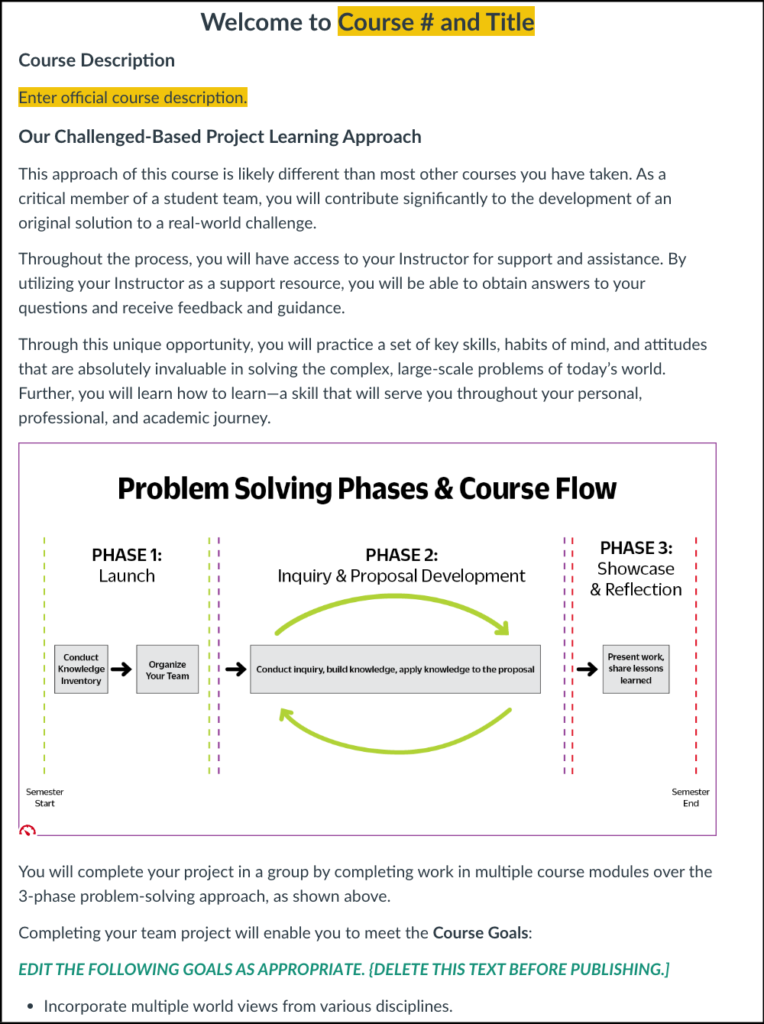Leveraging A Challenge Project Course Template
CATLR’s Challenge Project Course template is a tool you can use to build a project-based course in Canvas. The template is available in Canvas Commons and you can use it in courses in any discipline and at any level, whether conducted online, on ground, or in a hybrid format.
The template structure and guidance can save you a great deal of time in course development. Another advantage of the template is that it clearly shows what evidence-based practices should be applied throughout the course to support robust student problem- or project-based learning. In addition, the template includes teamwork support documents, sample reflection prompts, and sample rubrics.

The template is built around the three-phase problem solving model pictured above (Phase 1: Launch, Phase 2: Inquiry and Proposal Development, and Phase 3: Showcase and Reflection). With this model, students learn course content and skills inductively by conducting inquiry and analysis, and developing results in response to a “driving question” (Buck Institute for Education, 2003). Challenge-based courses offer Northeastern students engaging experiential learning opportunities that can equip them with valuable professional skills. Further, studies have shown that project-based courses can have significant benefits for students from historically underrepresented or disadvantaged groups, as well as for women in STEM courses. Outcomes for these groups have included greater confidence and more positive self-perceptions (Chen & Dong, 2015), increases in perceived value of course content (Beier et al., 2019), and gains in class attendance (Creghan & Adair-Creghan, 2015).
This template has been used in 30 different “Global Challenge Courses” that were part of Northeastern’s NU Start and Global ConnEXions programs. Feedback about these courses has been highly positive, indicating that students were motivated and engaged, and learned not only content, but also important skills such as inquiry and analysis, teamwork, problem solving, and communication. Additionally, instructors found the courses helpful as they learned to teach a project-based course for the first time.
Want to learn more about challenge-based courses?
- View a 3-minute video that explains how Challenge Project Courses work. In this video, the challenge projects were referred to as global challenges.
- View a 4-minute video that provides an overview of the template, including its structure and key components.
- Enroll in this challenged-based self-paced course to learn tips and strategies for design and facilitation of challenge-based courses.
- Import the Challenge Project Course Template into your Canvas course. Instructions: How to work with this template.
Want support in implementing the template?
Request an individual consultation by emailing us at [email protected]. You can also request a custom workshop for your department or other academic unit by emailing us at [email protected].
References
Beier, M. E., Kim, M. H., Saterbak, A., Leautaud, V., Bishnoi, S., & Gilberto, J. M. (2019). The effect of authentic project-based learning on attitudes and career aspirations in STEM. Journal of Research in Science Teaching, 56(1), 3–23. https://doi.org/https://doi.org/10.1002/tea.21465
Buck Institute for Education (2003). Project-based learning: A guide to standards-focused project based learning for middle and high school teachers. Oakland, CA: Wilsted & Taylor.
Chen, P., Hernandez, A., & Dong, J. (2015). Impact of Collaborative Project-Based Learning on Self-Efficacy of Urban Minority Students in Engineering. Journal of Urban Learning, Teaching, and Research, 11, 26–39. https://eric.ed.gov/?id=EJ1071407
Creghan, C., & Adair-Creghan, K. (2015). The positive impact of project-based learning on attendance of an economically disadvantaged student population: A multiyear study. Interdisciplinary Journal of Problem-Based Learning, 9(2). https://doi.org/10.7771/1541-5015.1496
